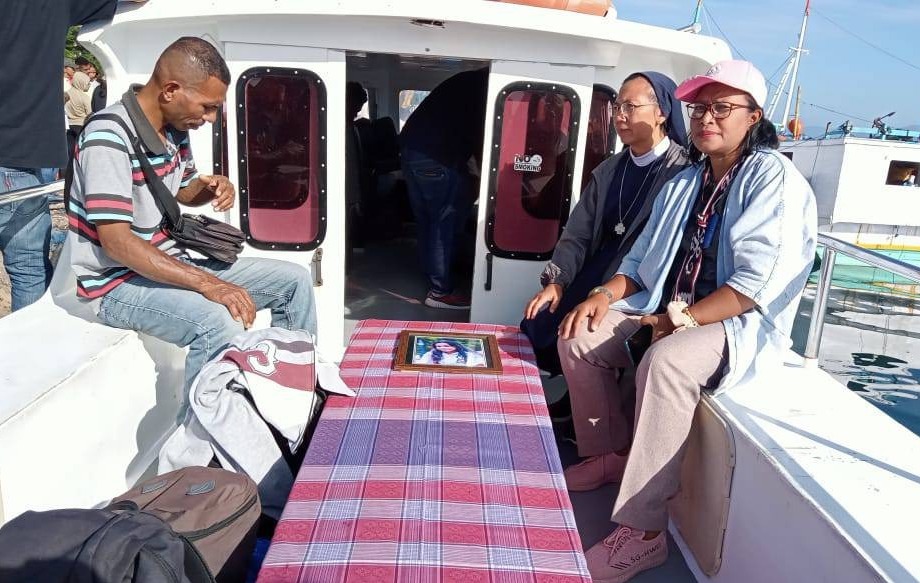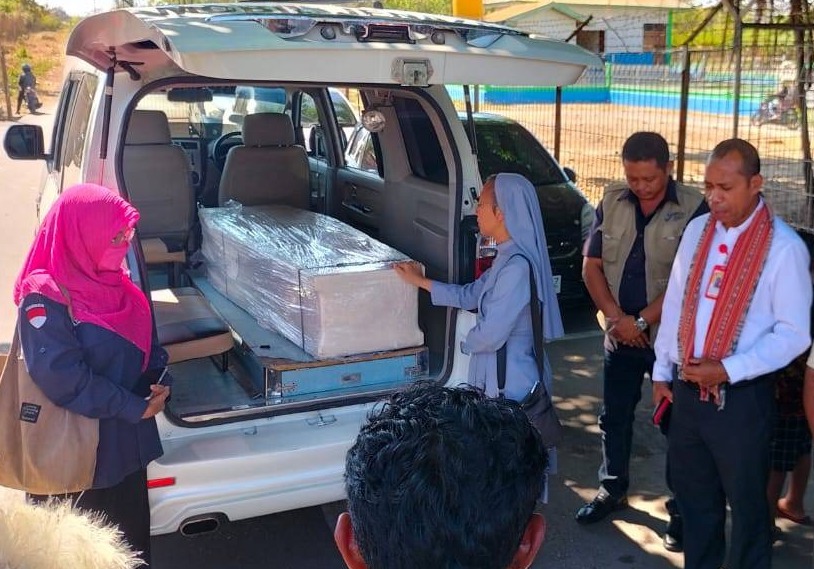Floresa.co – Activists in Indonesai’s East Nusa Tenggara [NTT] province criticized the latest US report that claimed Indonesia has made progress in tackling human trafficking issue, saying that it did not reflect the situation in the province.
“We envision [trafficking in persons handling] improvement occurring on a national scale. That didn’t happen in NTT,” said Kupang-based Sister Laurentina Suharsih.
The Catholic nun from the Congregation of the Sisters of Divine Providence is responding to the latest report by the US Department of State which puts Indonesia in an improved position on fighting the practice of trafficking in persons.
Indonesia, according to the Trafficking in Persons report released earlier this month, has moved up from Tier 2 Watchlist to Tier 2.
Countries in the Tier 2 Watchlist recorded severe numbers of victims of trafficking in persons, failed to demonstrate increased efforts to combat human trafficking and have not been able to meet the minimum standards of the Victims of Trafficking and Violence Protection Act [TVPA].
While a Tier 2 rating indicates that any government which has not been able to meet the minimum standards set out in the TVPA, it is starting to implement significant steps to meet those standards.
The Return of Migrant Workers
Sister Laurentina said that El Tari International Airport in Kupang is the biggest gateway for human trafficking in NTT, which unfortunately seems like there is no strict control from the authorities.
“Sometimes the victim flies alone or together with the perpetrator,” he said.
She said, they usually transit in Medan or Palembang, before continuing their journey to destination countries, such as Malaysia and Hong Kong.
According to Sister Laurentina, victims are generally lured by brokers who come to NTT’s villages.
The victims then signed contracts that were not valid, without the relevant skills and sufficient knowledge to fulfill their rights according to government regulations.
Most of the non-procedural migrant workers in NTT work in the oil palm plantation, fishing and household sectors.
Oil palm plantation workers, as she explained, usually live in hidden barracks, work overtime and are malnourished.
Meanwhile, in their employers’ homes, migrant workers who work as household assistants often experience physical and sexual violence.
Sister Laurentina said that there were various reasons that led to physical violence, ranging from being considered untidy, being lazy to refusing when forced to admit things they really didn’t do.
When they are sick, they can only heal themselves with medicines that are easy to find at the nearest shop, which sometimes makes their condition even worse.
“Ironic, but I have to say this,” she said, “when victims manage to return [to NTT], we have to accept them with four choices of conditions: die, live with a diseased body, live with a soul that needs to be healed, live with the body and souls who both need to be healed.”
Since 2016, the nun has been known as the “Cargo Sister.”

The victims who died were then escorted to their families for burial. Those who go home sick are accompanied first – before being returned to their families when they have recovered.
While the victims needed a long time to recover, she said, unfortunately the perpetrators were generally not arrested immediately and some of them were security forces.
“We found several suspected TPPO perpetrators in NTT who were members of the [local] police,” said Sister Laurentina.
She accompanied victims several times to report to the police regarding the alleged involvement of their members in TPPO.
Sister Laurentina’s confession about the alleged involvement of the authorities is not a new story.
The Head of the Indonesian Migrant Worker Protection Agency [BP2MI], Benny Rhamdani, recently stated that there are trafficking syndicates that untouchable for years because they are supported by security personnel ranging from the national police (Polri), national army (TNI) to ministries and institutions, including the BP2MI personnel themselves.
“I said there were TNI personnel, Polri personnel, ministries/agencies, the regional government, and persons at BP2MI involved. I want to be fair about this,” he said on July 4.
An investigative report by Floresa last year also revealed how at a port in Larantuka, East Flores, non-procedural workers left for Kalimantan, onward to Malaysia, without any control from the local authorities.
Collaboration Across All Stakeholders
Intellectual actors, brokers and “the agents in the TPPOs casse in NTT are untouchable by the law,” said Gabriel Goa Sola, a member of the Zero Human Trafficking Network lobbying and advocacy team, an organization that advocates for cases of human trafficking in NTT.
“The strong in power and those with strong capital enjoy the ringgit and dollars, while common people of NTT are the ones who bear the burden,” he said on July 5.
He said efforts to control this problem should reach villages, considering brokers also operate in remote areas.
“Don’t say that it is difficult to socialize anti-TPPO to NTT villages. The geographical condition of NTT, which is an archipelago, cannot be used as a justification for the ‘difficulty of socialization.'”
According to him, capabilities and various mediums in the digital era should be used more effectively to prevent human trafficking to even remote places.
The government can promote outreach through social media, radio and television.
“The government must also have the will to collaborate so that TPPO is no longer rampant,” said Gabi.
Sister Laurentina said that apart from handling victims who returned to NTT, they are currently working on cross-country collaborations to ensure that there are services for those who are still working abroad.
Her congregation is intensively coordinating with a number of dioceses in Malaysia. They also have partners in transit cities/districts for prospective migrant workers.
“We do all of this because the government’s efforts have never been maximal in handling TPPO in NTT,” said Sister Laurentina.
She quoted reports from the mass media that said two bodies of migrant workers arrived in Indonesia on a daily basis.
“In NTT, we have received up to four bodies a day several times,” he said.
According to data from the NTT BP2MI, a total of 68 bodies of NTT migrant workers were sent via El Tari Airport during January-June 2023.
The latest was the body of Eduardus Pita [35] from Nagekeo Regency, who arrived on June 29. A few days earlier on June 24, four bodies arrived from the Malaysian states of Selangor, Perak and Sabah.


